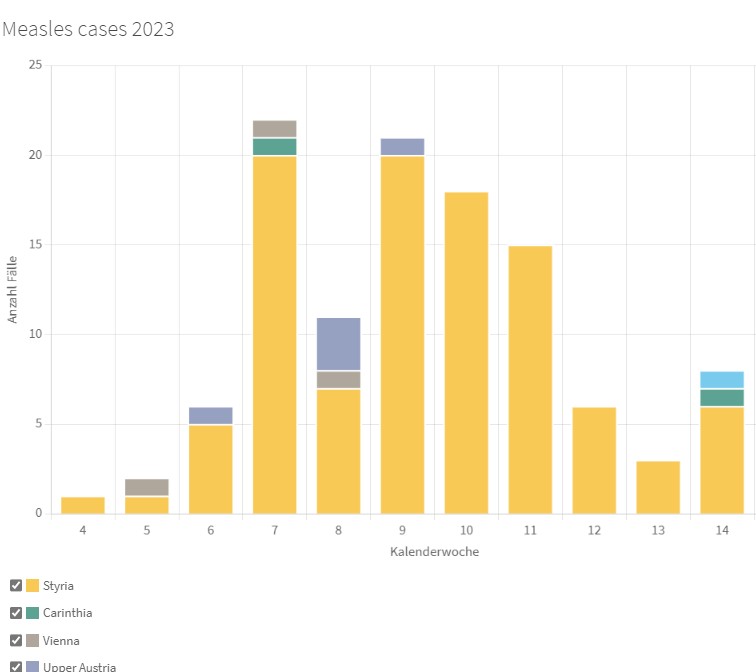Measles is back. After a significant decline in cases during the COVID-19 pandemic, one of the world’s most infectious viral diseases has returned to Europe. In 2022, there were 127 people reported to have been infected in the European Union/European Economic Area, according to a new report by the European Centre for Disease Prevention & Control (ECDC).
However, the relatively low rate of disease can be attributed to reduced social interaction and school closures during the pandemic, along with lower rates of measles detection while laboratories focused on COVID-19 testing. Now, with social restrictions a distant memory, and some children having missed out on routine measles immunisation, the virus is spreading again.

Several countries are now reporting a surge in cases, with Austria topping the list. Of the 113 cases confirmed in Austria by 21 April 2023, the vast majority were in Styria, the country’s second largest state. Styria is home to the city of Graz and borders Slovenia.
Last year, Austria recorded a single case of measles over a 12 month period. But the disease has made a stunning return. Austria’s measles-free status will be at risk unless outbreaks come under control quickly.
Dr Piotr Kramarz, ECDC Deputy Chief Scientist, said several other countries were also reporting cases, sparking concerns that multiple outbreaks may be under way. ‘One case can cause up to 18 more cases,’ he said. ‘That is why we need very high vaccination rates ‒ 95% with two doses of measles-containing vaccine ‒ in every community.’
He added that the worst-affected age group was in infants aged less than one year ‒ the age at which measles vaccines are offered. ‘This group is not usually vaccinated. The way to protect them is through high vaccination coverage in the community around them. It’s a matter of solidarity.’
Many cases of measles are mild. However, the disease can have devastating consequences including, in rare instances, a fatal brain swelling condition known as SSPE.
For example, Max Schoenbohm, a German boy who contracted measles when he was six months old, developed SSPE later in childhood. His father has told his story to raise awareness of the risks, while Max’s brother made a short film in English and German on the family’s loss.
Measles can also have a lasting impact on the immune system. Research suggests that measles infection can ‘wipe the immune system’s memory for up to three years’, increasing the risk of catching other infectious diseases. This ‘immune amnesia’ can also add to pressures on hospital systems by leaving children vulnerable to flu and pneumonia.
As well as cases in infants, there are significant case numbers in unvaccinated young adults across Europe. ‘Measles is no longer a childhood disease,’ Dr Kramarz said. ‘It is important to close the immunisation gaps in this age category.’
Launching the measles report, and another on polio, during European Immunization Week, ECDC officials said vaccination offers protection at all stages of life. Andrea Ammon, ECDC Director, highlighted the importance of protecting people in their adolescent years and during pregnancy, as well as those living with chronic diseases and the elderly.
‘I want to encourage people of all age groups to consult their national immunisation strategies and speak to their doctors to ensure they don’t miss out,’ she said.
The ECDC also warned that any fall in polio vaccination rates leaves the way open for the virus to take hold. Europe is currently ‘polio free’, but this cannot be taken for granted. Between 2012 and 2021, approximately 2.4 million children in the EU/EEA may not have completed the course of polio-containing vaccines.
‘As long as there are non-vaccinated or under-vaccinated population groups in European countries and polio is not eradicated globally, the risk of the virus being reintroduced in Europe remains,’ Dr Ammon said.
Missed doses of #measles vaccine have led to outbreaks in the WHO European Region. Follow the schedule for all vaccines and catch your children up on any missed doses. #EveryDoseCounts
— WHO/Europe – VPI (@WHO_Europe_VPI) April 24, 2023
👉Find out what you need to know about measles:https://t.co/MpoMeVefoT pic.twitter.com/VxGFJJ0pSL
Measles outbreak warning
The ECDC’s warnings echo comments earlier this week from WHO officials who reported several outbreaks across the wider 53-country European Region. Dr Siddhartha Datta, Regional Advisor for Vaccine-preventable Diseases and Immunization, at the WHO Regional Office for Europe, told Vaccines Today of growing concern that measles could spread widely in the coming months.
‘Last year, over 900 measles cases were reported in the European region over a 12-month period. That number was already exceeded in the first two months of 2023,’ Dr Datta said. ‘This year may be a big year for measles.’
Authorities across Europe are working to identify and vaccinate people who may have missed out on recommended vaccines in recent years. In particular, communities with low rates of vaccine coverage are being prioritised by some countries and regions as part of The Big Catch-up designed to address gaps in coverage.
‘If health systems are not reaching children with measles vaccines, the virus will definitely show you where the gaps are,’ Dr Datta said.




